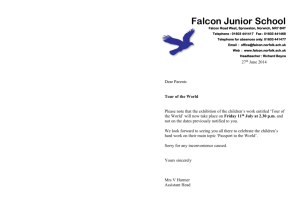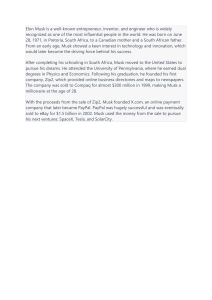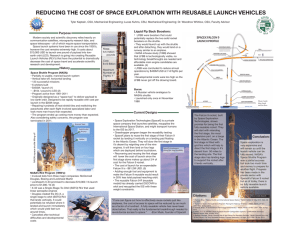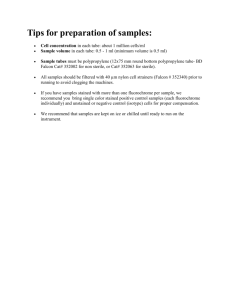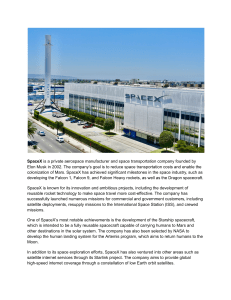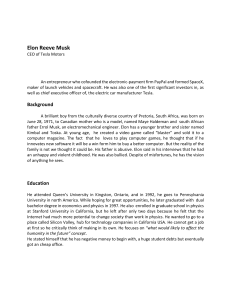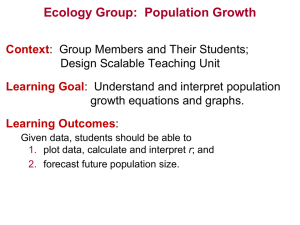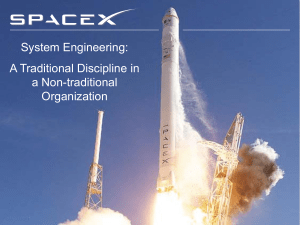Statement of Mr. Elon Musk CEO and Chief Technology Officer
advertisement
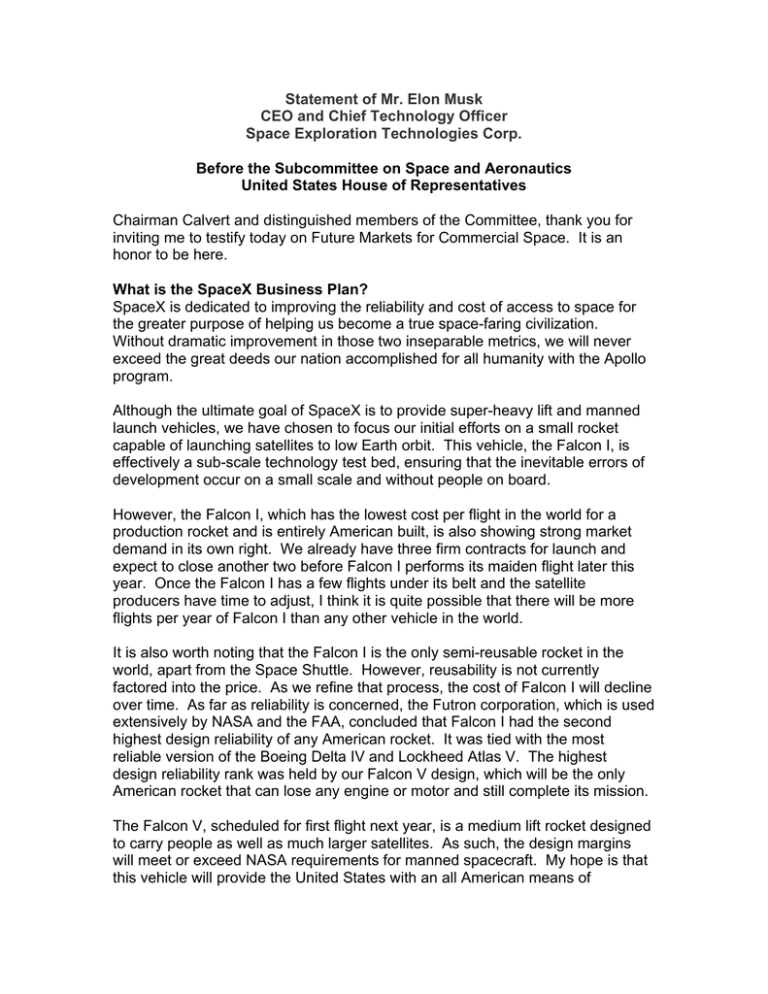
Statement of Mr. Elon Musk CEO and Chief Technology Officer Space Exploration Technologies Corp. Before the Subcommittee on Space and Aeronautics United States House of Representatives Chairman Calvert and distinguished members of the Committee, thank you for inviting me to testify today on Future Markets for Commercial Space. It is an honor to be here. What is the SpaceX Business Plan? SpaceX is dedicated to improving the reliability and cost of access to space for the greater purpose of helping us become a true space-faring civilization. Without dramatic improvement in those two inseparable metrics, we will never exceed the great deeds our nation accomplished for all humanity with the Apollo program. Although the ultimate goal of SpaceX is to provide super-heavy lift and manned launch vehicles, we have chosen to focus our initial efforts on a small rocket capable of launching satellites to low Earth orbit. This vehicle, the Falcon I, is effectively a sub-scale technology test bed, ensuring that the inevitable errors of development occur on a small scale and without people on board. However, the Falcon I, which has the lowest cost per flight in the world for a production rocket and is entirely American built, is also showing strong market demand in its own right. We already have three firm contracts for launch and expect to close another two before Falcon I performs its maiden flight later this year. Once the Falcon I has a few flights under its belt and the satellite producers have time to adjust, I think it is quite possible that there will be more flights per year of Falcon I than any other vehicle in the world. It is also worth noting that the Falcon I is the only semi-reusable rocket in the world, apart from the Space Shuttle. However, reusability is not currently factored into the price. As we refine that process, the cost of Falcon I will decline over time. As far as reliability is concerned, the Futron corporation, which is used extensively by NASA and the FAA, concluded that Falcon I had the second highest design reliability of any American rocket. It was tied with the most reliable version of the Boeing Delta IV and Lockheed Atlas V. The highest design reliability rank was held by our Falcon V design, which will be the only American rocket that can lose any engine or motor and still complete its mission. The Falcon V, scheduled for first flight next year, is a medium lift rocket designed to carry people as well as much larger satellites. As such, the design margins will meet or exceed NASA requirements for manned spacecraft. My hope is that this vehicle will provide the United States with an all American means of transporting astronauts to orbit and ensure that we are beholden to no one once the Shuttle retires. All in all, I see an increasingly positive future for commercial space activities over the next five to ten years. What should the government do or not do to encourage the nascent commercial space industry? The most important thing that the government should do is adopt a nurturing and supportive attitude towards new entrepreneurial efforts. In particular, the government should seek to purchase early launches as well as offer prizes for concrete achievements. Evidence for the tremendous power of prizes can be found throughout history, most recently with the X Prize. Regarding purchasing early launches, the Defense Department has been very supportive and has done the right thing at every level, purchasing two of the four launches we have sold to date. Regrettably, however, NASA has not yet procured a launch and has provided less financial support than the Malaysian Space Agency, who has bought and paid for a flight on Falcon I. However, I am very much heartened by the recent confirmation of Dr. Griffin as the new NASA Administrator. I am confident that his outstanding technical ability, dedication and diverse experience will invigorate our space program. With a finite budget and entrenched interests to fight, Dr. Griffin will be forced to make some difficult decisions in the years ahead. I urge Congress to give its full support to Dr. Griffin when he does so. As far as what the government should not do, I think it is important to minimize the regulatory burden required for space launch activities. We should do no more than is necessary to protect the uninvolved public. It sometimes seems to me that our society is paving the road to hell one regulation at a time. Are there implications for the commercial space industry as you see it in the President’s announced Vision for Space Exploration? The NASA budget is unlikely to see significant increases in coming years and in fact will face severe pressure from entitlements in the next decade. Compounding the problem, US launch prices from existing contractors are increasing every year, sometimes significantly. Unless we can reverse the trend of rising costs, NASA will be placed in a continually tightening financial vice, accomplishing less and less each year. Therefore, the only way that our country can meet the President’s Vision in a meaningful way is by encouraging the development of new, low cost access to space. If we can’t afford to get there, the Vision will become nothing more than a mirage. About Elon Musk Elon is the CEO & Chief Technology Officer of Space Exploration Technologies (SpaceX), which is developing a family of launch vehicles intended to reduce the cost and increase the reliability of access to space ultimately by a factor of ten. The company officially began operations in June 2002 and is located in the heart of the aerospace industry in Southern California. SpaceX is the third company founded by Mr. Musk. Prior to SpaceX, he cofounded PayPal, the world's leading electronic payment system, and served as the company's chairman and CEO. PayPal has over sixty-five million customers in 38 countries, processes tens of billions dollars per year and went public on the NASDAQ under PYPL in early 2002. Mr. Musk was the largest shareholder of PayPal until the company was acquired by eBay for $1.5 billion in October 2002. Before PayPal, Mr. Musk co-founded Zip2 Corporation in 1995, a leading provider of enterprise software and services to the media industry, with investments from The New York Times Company, Knight-Ridder, MDV, Softbank and the Hearst Corporation. He served as Chairman, CEO and Chief Technology Officer and in March 1999 sold Zip2 to Compaq for $307 million in an all cash transaction. Mr. Musk's early experience extends across a spectrum of advanced technology industries, from high energy density ultra-capacitors at Pinnacle Research to software development at Rocket Science and Microsoft. He has a physics degree from the University of Pennsylvania, a business degree from Wharton and originally came out to California to pursue graduate studies in high energy density capacitor physics & materials science at Stanford.
